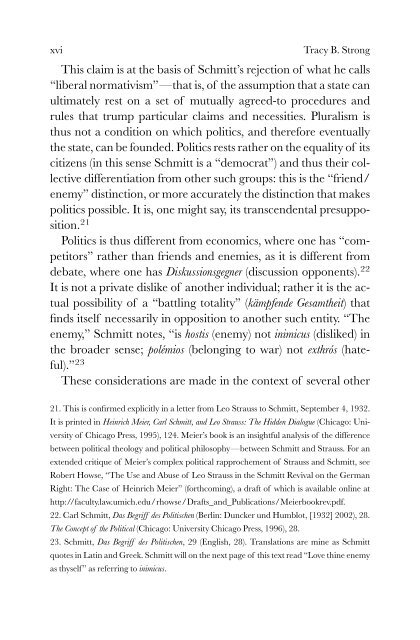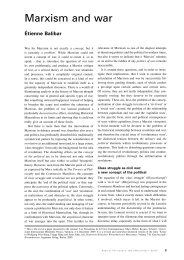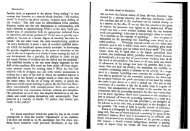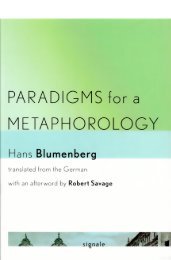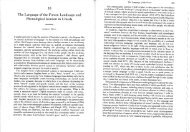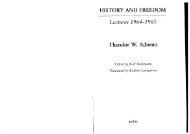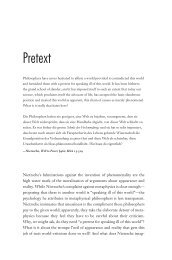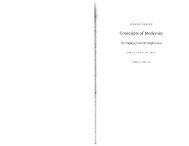Schmitt-Political Theology I.pdf - Townsend Humanities Lab
Schmitt-Political Theology I.pdf - Townsend Humanities Lab
Schmitt-Political Theology I.pdf - Townsend Humanities Lab
You also want an ePaper? Increase the reach of your titles
YUMPU automatically turns print PDFs into web optimized ePapers that Google loves.
xvi Tracy B. Strong<br />
This claim is at the basis of <strong>Schmitt</strong>’s rejection of what he calls<br />
“liberal normativism”—that is, of the assumption that a state can<br />
ultimately rest on a set of mutually agreed-to procedures and<br />
rules that trump particular claims and necessities. Pluralism is<br />
thus not a condition on which politics, and therefore eventually<br />
the state, can be founded. Politics rests rather on the equality of its<br />
citizens (in this sense <strong>Schmitt</strong> is a “democrat”) and thus their collective<br />
differentiation from other such groups: this is the “friend/<br />
enemy” distinction, or more accurately the distinction that makes<br />
politics possible. It is, one might say, its transcendental presupposition.<br />
21<br />
Politics is thus different from economics, where one has “competitors”<br />
rather than friends and enemies, as it is different from<br />
debate, where one has Diskussionsgegner (discussion opponents). 22<br />
It is not a private dislike of another individual; rather it is the actual<br />
possibility of a “battling totality” (kämpfende Gesamtheit) that<br />
finds itself necessarily in opposition to another such entity. “The<br />
enemy,” <strong>Schmitt</strong> notes, “is hostis (enemy) not inimicus (disliked) in<br />
the broader sense; polémios (belonging to war) not exthrós (hateful).”<br />
23<br />
These considerations are made in the context of several other<br />
21. This is confirmed explicitly in a letter from Leo Strauss to <strong>Schmitt</strong>, September 4, 1932.<br />
It is printed in Heinrich Meier, Carl <strong>Schmitt</strong>, and Leo Strauss: The Hidden Dialogue (Chicago: University<br />
of Chicago Press, 1995), 124. Meier’s book is an insightful analysis of the difference<br />
between political theology and political philosophy—between <strong>Schmitt</strong> and Strauss. For an<br />
extended critique of Meier’s complex political rapprochement of Strauss and <strong>Schmitt</strong>, see<br />
Robert Howse, “The Use and Abuse of Leo Strauss in the <strong>Schmitt</strong> Revival on the German<br />
Right: The Case of Heinrich Meier” (forthcoming), a draft of which is available online at<br />
http://faculty.law.umich.edu/rhowse/Drafts_and_Publications/Meierbookrev.<strong>pdf</strong>.<br />
22. Carl <strong>Schmitt</strong>, Das Begriff des Politischen (Berlin: Duncker und Humblot, [1932] 2002), 28.<br />
The Concept of the <strong>Political</strong> (Chicago: University Chicago Press, 1996), 28.<br />
23. <strong>Schmitt</strong>, Das Begriff des Politischen, 29 (English, 28). Translations are mine as <strong>Schmitt</strong><br />
quotes in Latin and Greek. <strong>Schmitt</strong> will on the next page of this text read “Love thine enemy<br />
as thyself” as referring to inimicus.


